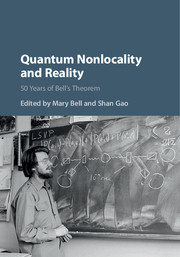Book contents
- Frontmatter
- Contents
- Contributors
- Preface
- Preface
- Part I John Stewart Bell: The Physicist
- Part II Bell's Theorem
- Part III Nonlocality: Illusion or Reality?
- 9 Strengthening Bell's Theorem: Removing the Hidden-Variable Assumption
- 10 Is Any Theory Compatible with the Quantum Predictions Necessarily Nonlocal?
- 11 Local Causality, Probability and Explanation
- 12 The Bell Inequality and the Many-Worlds Interpretation
- 13 Quantum Solipsism and Nonlocality
- 14 Lessons of Bell's Theorem: Nonlocality, Yes; Action at a Distance, Not Necessarily
- 15 Bell Nonlocality, Hardy's Paradox and Hyperplane Dependence
- 16 Some Thoughts on Quantum Nonlocality and Its Apparent Incompatibility with Relativity
- 17 A Reasonable Thing That Just Might Work
- 18 Weak Values and Quantum Nonlocality
- Part IV Nonlocal Realistic Theories
- Index
- References
11 - Local Causality, Probability and Explanation
from Part III - Nonlocality: Illusion or Reality?
Published online by Cambridge University Press: 05 September 2016
- Frontmatter
- Contents
- Contributors
- Preface
- Preface
- Part I John Stewart Bell: The Physicist
- Part II Bell's Theorem
- Part III Nonlocality: Illusion or Reality?
- 9 Strengthening Bell's Theorem: Removing the Hidden-Variable Assumption
- 10 Is Any Theory Compatible with the Quantum Predictions Necessarily Nonlocal?
- 11 Local Causality, Probability and Explanation
- 12 The Bell Inequality and the Many-Worlds Interpretation
- 13 Quantum Solipsism and Nonlocality
- 14 Lessons of Bell's Theorem: Nonlocality, Yes; Action at a Distance, Not Necessarily
- 15 Bell Nonlocality, Hardy's Paradox and Hyperplane Dependence
- 16 Some Thoughts on Quantum Nonlocality and Its Apparent Incompatibility with Relativity
- 17 A Reasonable Thing That Just Might Work
- 18 Weak Values and Quantum Nonlocality
- Part IV Nonlocal Realistic Theories
- Index
- References
Summary
Abstract
In papers published in the 25 years following his famous 1964 proof, John Bell refined and reformulated his views on locality and causality. Although his formulations of local causality were in terms of probability, he had little to say about that notion. But assumptions about probability are implicit in his arguments and conclusions. Probability does not conform to these assumptions when quantum mechanics is applied to account for the particular correlations Bell argues are locally inexplicable. This account involves no superluminal action and there is even a sense in which it is local, but it is in tension with the requirement that the direct causes and effects of events be nearby.
Introduction
I never met John Bell, but his writings have supplied me with a continual source of new insights as I read and reread them over 40 years. As I worked toward a rather different understanding of quantum mechanics he was foremost in my mind as a severe but honest critic of such attempts. We all would love to know what Einstein would have made of Bell's theorem. I confess that the deep regret I feel that Bell cannot respond to this paper is sometimes assuaged by a sense of relief.
Locality and Local Causality
In his seminal 1964 paper [1], John Bell expressed locality as the requirement
that the result of a measurement on one system be unaffected by operations on a distant system with which it has interacted in the past.
[2, p. 14]This seems to require that the result of a measurement would have been the same, no matter what operations had been performed on such a distant system. But suppose the result of a measurement were the outcome of an indeterministic process. Then the result of the measurement might have been different even if exactly the same operations (if any) had been performed on that distant system. So can no indeterministic theory satisfy the locality requirement? Bell felt no need to address that awkward question in his 1964 paper [1], since he took the EPR argument to establish that any additional variables needed to restore locality and causalitywould have to determine a unique result of ameasurement.
Information
- Type
- Chapter
- Information
- Quantum Nonlocality and Reality50 Years of Bell's Theorem, pp. 172 - 194Publisher: Cambridge University PressPrint publication year: 2016
References
Accessibility standard: Unknown
Why this information is here
This section outlines the accessibility features of this content - including support for screen readers, full keyboard navigation and high-contrast display options. This may not be relevant for you.Accessibility Information
- 2
- Cited by
